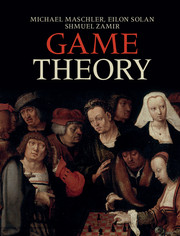Book contents
- Frontmatter
- Contents
- Acknowledgments
- Notations
- Introduction
- 1 The game of chess
- 2 Utility theory
- 3 Extensive-form games
- 4 Strategic-form games
- 5 Mixed strategies
- 6 Behavior strategies and Kuhn's Theorem
- 7 Equilibrium refinements
- 8 Correlated equilibria
- 9 Games with incomplete information and common priors
- 10 Games with incomplete information: the general model
- 11 The universal belief space
- 12 Auctions
- 13 Repeated games
- 14 Repeated games with vector payoffs
- 15 Bargaining games
- 16 Coalitional games with transferable utility
- 17 The core
- 18 The Shapley value
- 19 The bargaining set
- 20 The nucleolus
- 21 Social choice
- 22 Stable matching
- 23 Appendices
- References
- Index
Introduction
- Frontmatter
- Contents
- Acknowledgments
- Notations
- Introduction
- 1 The game of chess
- 2 Utility theory
- 3 Extensive-form games
- 4 Strategic-form games
- 5 Mixed strategies
- 6 Behavior strategies and Kuhn's Theorem
- 7 Equilibrium refinements
- 8 Correlated equilibria
- 9 Games with incomplete information and common priors
- 10 Games with incomplete information: the general model
- 11 The universal belief space
- 12 Auctions
- 13 Repeated games
- 14 Repeated games with vector payoffs
- 15 Bargaining games
- 16 Coalitional games with transferable utility
- 17 The core
- 18 The Shapley value
- 19 The bargaining set
- 20 The nucleolus
- 21 Social choice
- 22 Stable matching
- 23 Appendices
- References
- Index
Summary
What is game theory?
Game theory is the name given to the methodology of using mathematical tools to model and analyze situations of interactive decision making. These are situations involving several decision makers (called players) with different goals, in which the decision of each affects the outcome for all the decision makers. This interactivity distinguishes game theory from standard decision theory, which involves a single decision maker, and it is its main focus. Game theory tries to predict the behavior of the players and sometimes also provides decision makers with suggestions regarding ways in which they can achieve their goals.
The foundations of game theory were laid down in the book The Theory of Games and Economic Behavior, published in 1944 by the mathematician John von Neumann and the economist Oskar Morgenstern. The theory has been developed extensively since then and today it has applications in a wide range of fields. The applicability of game theory is due to the fact that it is a context-free mathematical toolbox that can be used in any situation of interactive decision making. A partial list of fields where the theory is applied, along with examples of some questions that are studied within each field using game theory, includes:
Theoretical economics. A market in which vendors sell items to buyers is an example of a game. Each vendor sets the price of the items that he or she wishes to sell, and each buyer decides from which vendor he or she will buy items and in what quantities. […]
Information
- Type
- Chapter
- Information
- Game Theory , pp. xxiii - xxviPublisher: Cambridge University PressPrint publication year: 2013
